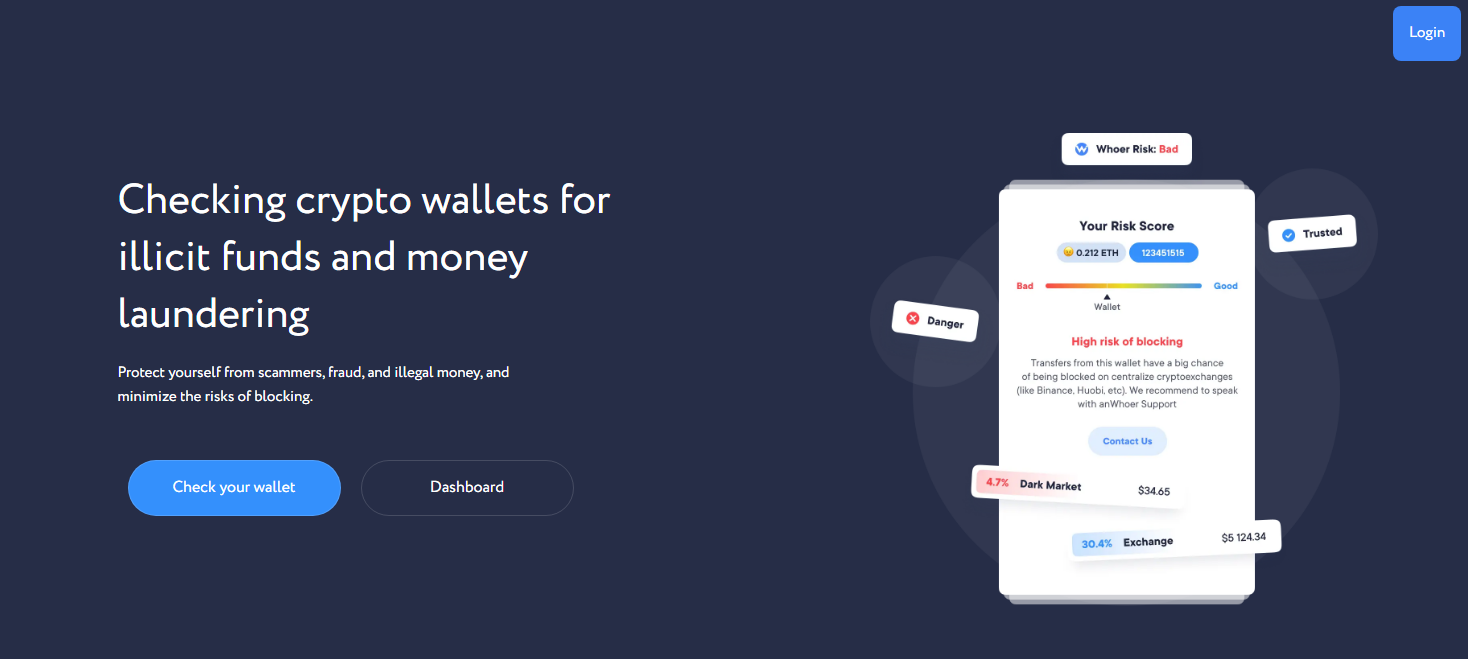What is AML crypto verification and why check crypto wallets
Did you know that the popular security service Whoer.net offers a cryptocurrency wallet security check for transfers? This service is called AML cryptocurrency verification, and it’s vital for anyone who regularly receives or sends crypto. But why? Let’s find out. Along the way, we’ll explore what this verification includes and the results it provides.

How criminals use cryptocurrency
Both cryptocurrency professionals and ordinary workers receiving payment in Bitcoin use cryptocurrency wallets. However, it’s crucial to consider where the funds you receive during exchanges and trading on cryptocurrency exchanges originate from. Besides regular users, individuals engaged in illegal activities actively trade cryptocurrency. Money laundering through exchanges and the accounts of ordinary users has become common practice. Criminals employ various methods, including mixers, intermediary transit addresses, and other means, to conceal the source of funds.
Regular users are at risk when criminals use exchanges and the accounts of ordinary people for money laundering. This can lead to unexpected legal consequences for wallet owners: their accounts may be blocked, and their funds deemed “dirty.” Consequently, you could lose your savings.
It’s important to be aware of these potential threats and take precautions. Regularly checking wallets for possible involvement in shadow operations and using reliable and verified cryptocurrency services can help reduce risks and ensure the security of your financial assets.
What is AML and how does it work
AML (Anti-Money Laundering) checks involve scrutinizing the origins of cryptocurrency deposits into your wallet and evaluating the risk associated with handling these funds. This is essential for preventing exposure to illicit cryptocurrency and safeguarding your account from potential suspensions.
When utilizing online platforms like Whoer’s AML verification of cryptocurrency wallets encompasses several fundamental steps:
Source analysis of cryptocurrency funds:
AML crypto services delve into the origins of funds entering specific cryptocurrency wallets, tracing past transactions to ascertain any links to fraudulent or unlawful activities.
Assessment of fund risks:
The service gauges the level of risk tied to the funds within the wallet, determining the probability of their involvement in illegal operations.
Utilization of databases and sanctions:
AML services cross-check wallets against databases containing sanctioned entities and terrorist watchlists, preventing transactions with undesirable individuals or entities.
Transaction pattern scrutiny:
Both present and past wallet transactions undergo scrutiny, including an analysis of transaction volumes, frequencies, and amounts to flag any anomalies or irregularities indicative of potential illicit activities.
Integration of blockchain technology:
AML services leverage blockchain technologies for enhanced transaction monitoring and analysis, facilitating precise identification of fund origins and tracking their movement across the blockchain.
Deployment of multi-criteria algorithms:
AML analysis incorporates sophisticated multi-criteria algorithms to detect potentially suspicious transactions, considering various factors such as transaction volume, asset types involved, and time intervals between transactions.
Collaboration with other services:
AML services collaborate with cryptocurrency exchanges and financial institutions to exchange information and broaden coverage in the fight against illicit activities.
Why is conducting AML checks on cryptocurrency wallets important
AML wallet checks help identify transaction risks and safeguard your wallet and capital.
Before making a transaction with someone new on a cryptocurrency exchange, it’s smart to run an AML check using a cryptocurrency checker. If the Bitcoin AML check shows a high risk (70 points or more) or suggests the wallet has ties to money laundering, it’s best to avoid the deal. This prevents you from dealing with scammers and keeps your account safe from being blocked.
If you can’t verify the sender’s cryptocurrency address for any reason, it’s wise to create a new wallet and receive the funds there. Keep all documents and transaction records handy to defend yourself if needed. Only transfer funds to your main wallet if their source is unquestionable.
Additionally, it’s a good idea to create new wallets from time to time. This is because the AML status of your past associates may change. If any of them get blocked or sanctioned, it could affect your wallet’s risk score. By keeping your wallets up to date, you add an extra layer of security to your cryptocurrency transactions.

 Русский
Русский English
English